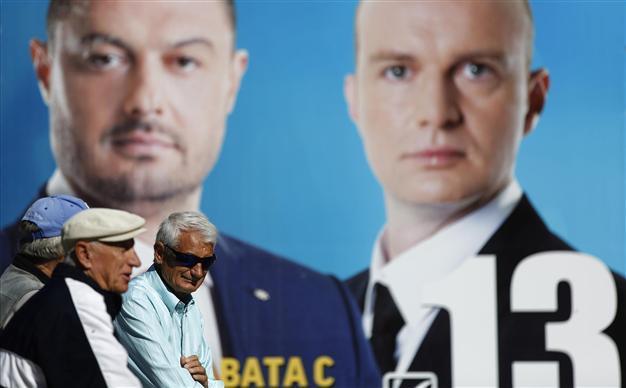Another election, same problems in Bulgaria
SOFIA - Agence France-Presse

Men chat in front of an election poster of Bulgaria's newly formed populist party "Bulgaria Without Censorship" in Plovdiv October 1, 2014. REUTERS Photo
Fed up with politicians, poverty and corruption, Bulgarians wearily trudge to the polls Sunday in an election that may deepen, not solve, the perennial political crisis in the EU's poorest country.
Ex-communist Bulgaria's second snap election in 17 months takes place in a country where the average monthly salary is stuck at 400 euros ($504) and where corruption and organised crime are rife.
Every fifth household lives below the poverty line and in a recent survey, 69 percent called the situation "unbearable".
Economic growth is sluggish and young people cannot wait to emigrate.
The fourth-largest bank has blocked cash withdrawals since June, some 375 million euros in EU funds are frozen and the Ukraine crisis threatens to hit supplies of Russian gas this winter.
Difficult reforms need to be made in healthcare, pension and education, and the Balkan country is struggling to cope with an influx of Syrian refugees from over the border with Turkey.
The man that polls predict will come first on Sunday, Boyko Borisov, the right-wing former bodyguard to Bulgaria's communist ex-dictator, makes no bones about the challenge ahead.
"The situation is very hard but people expect us to get our act together and take the country out of the crisis," he told AFP on the campaign trail.
"Expectations are huge and this obliges us to stop looking back and complaining, and to try and do what's necessary for the people here."
But whether the burly 55-year-old is up to the job is another matter, since this is the very same man who resigned as prime minister in February 2013 in the face of nationwide protests.
"Bulgaria will only exit from this kind of political crisis in five to seven years," political analyst Antony Galabov told AFP. "We are only in year two."
After Borisov last quit in 2013, elections resulted in a technocrat government backed by the Socialists and the Turkish minority party MRF and headed by economics professor Plamen Oresharski.
But almost from day one, Oresharski faced protests and calls to resign, particularly when a media mogul was unwisely named security chief, and this July his government too threw in the towel.
This time, Borisov's GERB party is expected to win 36-37 percent of the vote, opinion polls show, ahead of the Socialists on 22-23 percent and the MRF on 13 percent.
The key will be the performance of smaller parties including the far-right Ataka, polling at around four percent, the threshold for entering the 240-seat parliament.
With numerous investigations pointing to intimidation and vote-selling, even for food or firewood, one recent Alpha Research poll found 60 percent of people pessimistic about the elections.
"The Bulgarian parties only cater for the enrichment of their leaders. Elections do not change anything," electrician Stoimen Pavlov, 47, told AFP, adding that he "will vote but with disgust".
Whoever is elected in 7.4-million-strong Bulgaria "will know that he will be subjected to pressure, control and a critical eye from civil society," protester Ekaterina Damyanova said.
"If the new government doesn't stick to its promises, I will demonstrate again."
